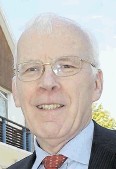
Sir Ian Wood has spoken about the work of his family trust in Africa – and how he felt compelled to help those less fortunate after being part of a “lucky generation” to have benefited from North Sea oil and gas.
The Aberdeen-based oil services entrepreneur gave evidence yesterday to a committee of MPs about the Wood Family Trust.
Sir Ian and his immediate family set up the trust in 2007 to invest £50million into economic, community and enterprise work in sub-Saharan Africa and the UK over five to 10 years.
He appeared before the international development committee at Westminster – which is chaired by Gordon MP Malcolm Bruce – as part of its inquiry into private-sector foundations.
The committee is assessing whether private foundations and public-sector agencies could work more closely together to maximise the benefits.
The Wood Family Trust has been helping smallhold tea farmers in Tanzania and Rwanda, aiming to at least double their income within three years.
“Essentially our focus is on economic activity – our headline is making markets work for the poor,” Sir Ian said.
“I guess you could call us venture philanthropists. We’re very business-orientated in our approach. We’re very implementation-orientated in our approach.
“We can do things quickly. We’re flexible, which is essential in Africa. There are so many unexpected issues that can arise.”
He said there could be a “very good marriage” between public and private-sector work, although he also pointed to the “understandable regulations and constraints” the government’s department for international development had to work under.
Mr Bruce asked Sir Ian whether businessmen such as himself brought an “economic respectability to aid”, which some people view as “handouts”.
Sir Ian said he had not thought about it. He added: “I just actually think I’ve been part of a very lucky generation, in terms of North Sea oil, and I think about the world.
“And goodness me, we all live on one planet for a short time and we should do everything we can to try and help.”
The hearing was the first evidence session during the committee’s inquiry.
After the meeting, Mr Bruce said: “We’re looking at what these people are doing and how does it impact on things public agencies are doing.
“The evidence revealed they are doing something really interesting that is quite different from what the public sector is doing.”
The Liberal Democrat added that there could be opportunities for increased partnership working with such foundations, although he would not want to “impose a civil service bureaucracy” on them.
Recommended for you
